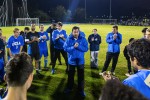To an outsider, the recent Varsity Blues scandal seemingly sunk UCLA men’s soccer.
But things weren’t going great for the program even with former coach Jorge Salcedo in charge.
The Bruins’ early exit in the 2018 NCAA Division I Men’s Soccer Championship was, admittedly, an improvement on last season’s record of 7-10-1 – the team’s worst finish in over 60 years. UCLA last lifted the trophy 17 years ago under the guidance of former coach Tom Fitzgerald in a 1-0 victory against Stanford.
Sophomore forward Milan Iloski pointed out after UCLA’s “embarrassing” first-round playoff defeat to Portland that the program wasn’t what it used to be.
“UCLA as a program is slowly turning from one of the best in the country to not a top program anymore,” Iloski said.
Salcedo may or may not have set aside roster spots for useless players, but he was still able to reel in seven No. 1-ranked recruiting classes in 15 years. The former coach had the talent – and $200,000 in illegal bribes – in his back pocket, but it never translated into titles.
Midfielder Frankie Amaya and midfielder Anderson Asiedu were drafted during the 2019 MLS SuperDraft in January. Defender and former team captain Erik Holt signed a homegrown contract with Real Salt Lake, and forward Mohammed Kamara also left to sign with SC Paderborn 07 – which is currently ranked fourth in 2. Bundesliga.
It is interesting that Kamara and Amaya – Salcedo’s two biggest recruits last year – left the program after one season, and it could be said the former coach’s playstyle never quite fit that of his roster’s.
Putting all of your resources into an undersized maestro like Amaya is not ideal when going up against tall and physical Pac-12 competitors. Under Salcedo, Amaya took more of a defensive role in the midfield that stifled him from developing into a shorter attacking playmaker like the Argentine legend Diego Maradona. Instead, he was bullied in the midfield and couldn’t create chances when opponents’ fullbacks closed down on UCLA’s wingers.
The 5-foot-4-inch Amaya clearly has the talent to contribute – he was the No. 1 pick in this year’s SuperDraft and is a key contributor on the U-20 U.S. men’s national team. As a Bruin, however, he notched just two goals and two assists in 14 appearances.
The Bruins also earned 39 yellow cards compared to their opponents’ 26 in the 2018 season, as well as 244 fouls and one red card. Kamara alone picked up six yellow cards in 14 appearances, seeing that his defensive duties consisted of stopping counterattacks and cutting through passing lanes.
Salcedo primarily used a flexible 3-5-2 system that deployed fullbacks as wingbacks. In this formation, the fullbacks typically went forward on overlapping runs or clogged the midfield to earn possession.
The Bruins dominated possession because of this, but their lack of pace on the wings and creativity in the final third saw that hard-earned possession typically go to waste. Many opponents parked the bus against UCLA and caught them on the counterattack, as seen in its four 0-1 losses this season.
As a result, the 2018 Bruins were defined by their finishing – more specifically, their lack of it. Shots off the woodwork and missed penalties significantly contributed to their season total of 259 shots and 13.6 shots per game.
UCLA looked like a deer in headlights when defending most counterattacks, conceding multiple close matches to unranked opponents.
To sum up 2018, Holt and Salcedo yelled a lot, but they only did just that. UCLA is uncertainly awaiting next season in light of Salcedo’s indictment and its departing playmakers.
UCLA’s coaching search currently consists of an open application on its website – all it takes is a resume, application and a few references – but this search is integral to the future of the program.
Maybe Salcedo’s departure was a blessing in disguise for the blue and gold – the program can now look toward rebuilding its reputation by recruiting a new class of eager student-athletes and hiring a modern head coach.
